(单词翻译:单击)
5.Stanislaw Jerzy Lec
5.斯坦尼斯洛·耶日·勒克
The Polish poet Stanislaw Jerzy Lec was a journalist working in Poland when the Nazis invaded. He tried to flee to Romania but was caught and wound up at the Ternopil concentration camp, where he was led into the woods, given a shovel, and forced to dig his final resting place.
波兰诗人斯坦尼斯洛是一位记者,纳粹入侵时正在波兰工作。他努力逃往罗马尼亚,但是被抓到了捷尔诺波尔集中营。他被带到树林里,被迫拿铁锹给自己挖墓穴。
The guards who had taken Lec became bored and hungry. One of them was forced to stand with the prisoner while the rest left to get supper. Lec waited until the right moment and killed his captor with a blow to the neck. He later captured the moment with the following poem: He who had dug his own grave looks attentively at the gravedigger's work, but not pedantically: for this one digs a grave not for himself
看管斯坦尼斯洛的卫兵感到烦躁、饥饿。其中必须有一个卫兵在其他人去吃晚饭时与犯人站在一起。斯坦尼斯洛等到时机成熟,重击卫兵脖子杀了他。后来他在一首诗中描述了这一刻:给自己挖坟墓的人 看起来坚决果断 对掘墓人的工作,但并不书生意气:因为他 掘的墓 不为自己。
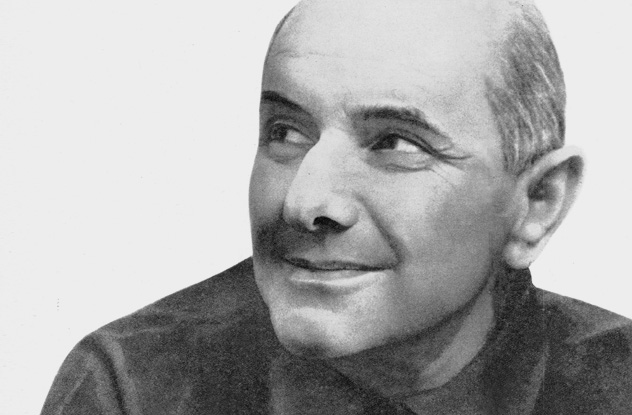
Donning the dead man's SS uniform, Lec made his way to Warsaw, where he met members of the Polish resistance. There, he put his literary skills to use publishing underground newspapers. He was also fluent in German and wrote leaflets for the resistance. He ended the war as a major in the Polish army and fought in battles pushing back against the Nazis.
穿上死去党卫军的制服,斯坦尼斯洛来到华沙,碰到了波兰抵抗军的成员。在那里,他运用他的文学技巧发行地下报纸。他的德语还十分流利,为抵抗军写了宣传册子。战争结束时,他是波兰军队的少校,参加过推翻纳粹的战斗。
4.Yoram Friedman
4.约拉姆·弗里德曼
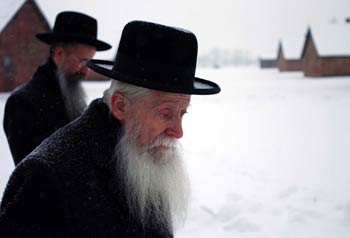
Yoram Friedman was five years old when Nazi troops arrived in his Polish hometown of Blonie. It was 1939, and within three years, Friedman and his family were forced into the infamous Warsaw Ghetto. About three-quarters of the 400,000 Jews who lived in the Ghetto were killed by the Nazis. Yet Friedman was smuggled out, leaving him to try to keep himself alive in Nazi-occupied Poland at the age of eight.
纳粹来到他的故乡——波兰的布隆尼时,约拉姆·弗里德曼才5岁。那是1939年,3年之后,弗里德曼和他的家人被赶进臭名昭著的华沙犹太区。住在贫民窟的400000犹太人中,约有四分之三被纳粹杀害。而弗里德曼8岁时被偷偷运出,靠自己在纳粹占领下的波兰生存。
He initially joined a group of Jewish orphans who survived by raiding farms, but that didn't last. Alone again, he knocked on the doors of Polish farmers to beg for help. After being rejected and beaten, he was taken in by a Catholic woman named Magda. She taught Friedman Catholic prayers, renamed him, and warned him never to urinate around Poles because it would reveal that he was circumcised. Local villagers nonetheless suspected that Magda was housing a Jew and reported her to the SS. Her home was burned to the ground, but Friedman was able to get away.He lived in the wild, tying himself to branches high in trees to sleep. He ate wild berries and whatever animals he could catch. A seemingly miraculous chance meeting with his father lasted only moments, when the elder Friedman was caught by Nazis and shot in a potato field.Friedman resumed his Catholic identity, going by the name of Jurek, and he found work on a farm. His arm got caught in a wheat grinder one day, and local doctors refused to treat him when they realized he was Jewish, so he lost his right arm entirely. Yet Friedman overcame even this, finding a place in an orphanage when the Soviets arrived in Poland. Three years later, he was found by a Jewish agency and arrived in Israel. Despite being illiterate at that point, teenage Friedman went on to earn a master's degree in math and spent his life as a teacher. In 2013 a film, Run Boy Run, was produced based on his story.
最初他加入了一群犹太孤儿。他们通过掠夺农场生存,但这没有持续太久。再次落单之后,他敲开波兰农户的门乞讨、求助。遭到拒绝和打骂后,他被天主教妇女玛格达收留。她教弗里德曼天主教的祈祷文,给他另起名字,还警告他不要在柱子旁边撒尿,以免暴露。尽管如此,当地村民仍旧怀疑玛格达屋里藏有犹太人,并把这件事举报给了党卫军。她家化为灰烬,但弗里德曼却逃跑了。他在荒郊野外生存,把自己绑在高高的树枝上睡觉。他吃野果子和任何抓得到的动物。他奇迹般地碰到了父亲,尽管两人见面的时间非常短暂;随后父亲被纳粹抓住,在一片土豆地里被枪毙。弗里德曼继续使用天主教身份,叫做朱瑞可,他在一个农场找到了一份工作。一天,他的手臂卡在小麦研磨机里,当地的医生发现他是犹太人后拒绝为他医治,导致他丢掉了整条右臂。然而,弗里德曼克服了这些艰难困苦,苏联人到达波兰时,他在一家孤儿院找到了安身之处。3年以后,一个犹太办事处找到他,他来到以色列。尽管那时大字不识,少年弗里德曼获得了数学硕士研究生学位,成为一名教师。2013年的电影《孩子快跑!》就是以他的故事为蓝本的。
3.Rolf Joseph
3.罗尔夫·约瑟夫
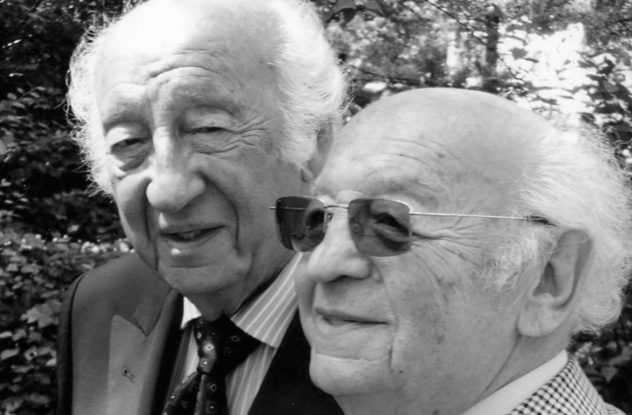
The Joseph brothers, Rolph and Alfred, had everything against them. They were teenagers in a Jewish family when Hitler came to power, and they lived in Berlin. Their father had fought for Germany during World War I, so they clung to hope that the family would be okay in his home city. But by the 1940s, the boys were left on their own, their parents arrested and shipped away by the Nazi regime.
约瑟夫兄弟,罗尔夫和阿尔弗雷德,事事不顺。希特勒掌权时,他们还是一个犹太家庭里的少年,住在柏林。父亲在一战期间为德军打仗,所以他们以为自己家在家乡不会出事。但是到40年代,父母被纳粹逮捕后送走,孩子们被迫自力更生。
No one who knew the brothers could shelter them together. So they lived separately but met every Wednesday at 11:00 AM, until one morning in 1942. Rolf was accosted by a German soldier and was taken away for interrogation. He was locked in a cell by the Gestapo and whipped for hours to reveal his hiding place and the whereabouts of his brother. Rolf held out, and he was on a train to Auschwitz the next day. Rolf grabbed a pair of pliers from a toolbox in the van that transported him to the train station. He used them to work himself out of his handcuffs. Rolf and his fellow prisoners were able to break a plank away from the side of their cattle car and jump from the train. Yet Rolf's freedom was short-lived. On the way to Berlin, he was betrayed to the Gestapo and arrested again. He was beaten so severely that he developed epilepsy. But Rolf was unbreakable, and he hatched a plan. When he was left alone, he scratched himself and convinced his guards that he was suffering from scarlet fever. The Germans, fearful of catching something, moved Rolf to a hospital. A guard stood outside Rolf's third-floor room, so he jumped out of the window.Despite breaking part of his spine, Rolf crawled through the city to his old hiding place. His brother was there, and the old woman who had taken them in moved them to some land she owned in Berlin's outskirts. The brothers were liberated by the Soviets in 1945, and Rolf went on to become an engineer.
知道这两兄弟的人都不敢同时收留他俩。他们分别待在两个地方,每周星期三上午11点见一面,直到1942年一天早上出了事。罗尔夫被一名德国士兵诱骗并带走问话。他被盖世太保锁在一间牢房里,还挨了几小时鞭子——被审问他的藏身之所和兄弟的行踪。罗尔夫招了,第二天就被火车送到了奥斯维辛。在运自己去火车站的货车上,罗尔夫在一个工具箱里找到一把钳子。他用这把钳子打开了手铐。罗尔夫和其他犯人得以打破牛车一侧的木板,跳车逃跑。但罗尔夫的自由转瞬即逝。在去柏林的路上,他被出卖给盖世太保,再次被捕。他遭到严刑拷打,以至患上癫痫。尽管如此,罗尔夫坚忍不拔,酝酿了一个计划。被单独留下后,他挠抓自己,让卫兵相信自己患上了猩红热。德国人害怕染上什么病,把罗尔夫移送给医院。他的病房在三楼,门外只站着一个卫兵,于是他跳窗逃跑。虽然摔伤了部分脊椎,罗尔夫爬着穿过城市,回到藏身的老地方。他的兄弟还在那儿,之前收留他们的老妇人把他们转移到她在柏林郊外的另一个处所。1945年,兄弟俩被苏联军队解放,罗尔夫后来成为了工程师。
2.The Chiger Family
2.恰杰一家
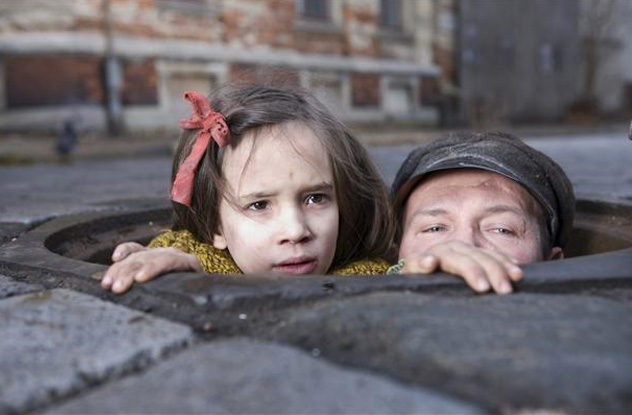
One of the largest Jewish ghettos created by the Nazis was in Lwow, Poland. When the Nazis invaded, 200,000 Jews lived in the city, half of them refugees from Germany. In June 1943, the Germans liquidated the ghetto, killing thousands of Jews in the process. Weeks before, a small group led by a man named Ignacy Chiger had dug their way through the floor of their building, using only cutlery. They wanted to find a place to hide, but before they could find a new home, they were found by Polish sewer workers. Among them was Leopold Socha, chief supervisor of the city's entire sewage system.
波兰的罗乌纳粹建立的大型犹太区之一。纳粹进犯时,城中住着200000犹太人,其中一半是德国难民。1943年6月,德国人清算这个犹太区,杀掉几千犹太人。几周之后,一个名叫伊格纳西·恰杰的人带领一群人仅用餐刀,从他们的建筑下面挖出一条地下通道。他们想找一个藏身之所,但还没找到就被波兰下水道工人发现了。利奥波德·索查也在其中,他是整个城市下水道系统的主要监管人。
Socha was sympathetic to their plight, but surviving in the sewers was hellish. The city's sewage system drained into the fast-moving River Poltwa. Early in their 14-month stay underground, the children's uncle slipped into the river and was washed away to his death. The sewer was shared with the city's rats, who tried to steal the group's food. Five weeks into the stay, the group was discovered by unfriendly workers and had to run into the darkness. They were lucky enough to bump into the workers who knew them, who guided them deeper to a new hiding place.When it rained heavily, their area of the sewer would flood and leave only a few inches of space. The parents held their children with faces pressed against the ceiling to breathe. Krystyna Chiger developed a phobia of rain. "I would sit and listen to hear if it was raining, and panic as soon as I heard rain drops," she said later. Both her children developed measles, but both miraculously survived. One of the women was pregnant when they entered the sewers. When their baby was born, its cries threatened to give away the group's existence. Giving testimony in 1947, Krystyna described how "they covered this child with a washbasin. It suffocated and was thrown into the Poltwa."Out of 21 who entered the sewers originally, only 10 survived. Krystyna was overjoyed when the Soviets arrived and she could leave the sewers. Brother Pawelek, too young to remember much of life out of the sewers, was scared of the light and people. He cried to go back underground.
索查很同情他们的困难,但是待在下水道难以忍受。城区的下水道系统接入湍急的河流。他们在地下度过了14个月;开始不久,孩子们的叔叔溜进河里,被河水冲走,一命呜呼。下水道里有老鼠,会抢他们的食物。待了5个星期后,他们被凶恶的工人发现,不得不逃进黑暗深处。幸运的是,他们碰上了熟悉的工人,被带到一处新的庇护所。下水道排水量大时,他们待的地方就会涨水,只留下几英寸空间。父母把孩子脸向上托起来,让孩子能够呼吸。克雷斯蒂娜·恰杰患上了怕雨的恐惧症。"我会坐下来听有没有下雨,只要听见雨滴声就会恐惧。"她后来说。虽然她的两个孩子都患上了麻疹,但都奇迹般地活了下来。逃进下水道的人中还有一名孕妇。婴儿出生时,它的哭声差点儿暴露他们。1947年克雷斯蒂娜出庭作证时描述,"他们用一个水槽盖住这个婴儿,它窒息死了,被扔进河里。"共有21人逃进下水道,最后只有10人幸存。克雷斯蒂娜对苏联人的到来高兴过度,她本可以离开下水道的。帕威尔勒克当时太小,对外面世界的生活没有记忆,很害怕光线和陌生人。他总说要回到地下去。
1.Michael Kutz
1.迈克尔·库兹
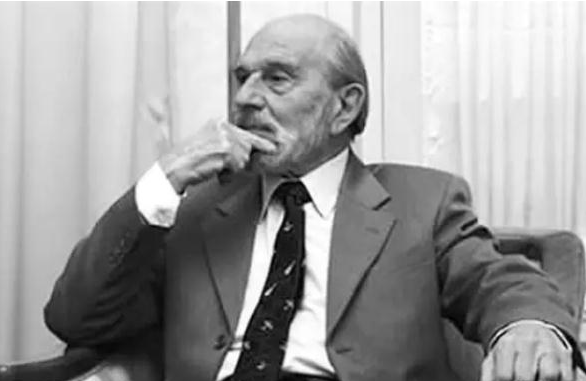
Michael Kutz was 10 when the Nazis arrived in Nieswiez, Belarus in June 1941. At first, they forced the town's 4,500 Jews to work. Kutz cleaned streets and toilets by day. At night he sneaked out and traded textiles for food, to feed him and his mother. On October 30, the Nazis made every Jew gather in the town square. Those who could work were placed in one group to be kept alive. The rest, including the children, were to be shot.
1941年6月纳粹来到白俄罗斯小镇涅斯维兹时,迈克尔·库兹才10岁。起初,全镇4500名犹太人被强迫工作。库兹白天打扫街道和厕所,晚上悄悄溜出去用丝织品换食物,养活自己和母亲。10月30日,纳粹让所有犹太人集中到小镇广场。有工作能力的人被分为一组,活了下来。其他人,包括孩子,都被枪毙了。
Nazi soldiers marched the condemned 5 kilometers (3 mi) into the countryside. Many were shot on the way. The Jews were forced to undress completely and lined up beside a mass grave. Yet the Nazis didn't shoot all of their captives before burying them. They ordered those remaining to jump into the pit to be buried alive. Kutz hesitated, and an officer smashed his head with a rifle. The young boy fell in and was slowly buried beneath the dead and the dying. He later recalled. "I tried as a kid to throw away dead bodies, dead parts of bodies and everything, and to be able to breathe, and then it was quiet."Kutz crawled up through the pit of bodies and saw that no one was there. He ran, still completely naked. He didn't stop until he reached a convent, where the nuns gave him clothes and some food. They were too fearful to harbor a Jewish runaway, though, and Kutz was on his own.He eventually met up with some Russian resistance fighters, who were impressed by Kutz's survival of the pits. They spent the next three years living in the forest, fighting the invading force. Only 12 other Jews from his town survived.Kutz wrote an autobiography, If, By Miracle. The title was inspired by the last words from his mother, whispered to him during their march to the death pit. "If, by miracle, you survive, you must bear witness," she told him. Through the hunger, rough sleeping, and difficulty of fighting, he says his mother's final words inspired him to go on.
纳粹士兵出城走过的5千米(3英里)备受唾弃——他们一边走一边射杀市民。犹太人被迫脱光衣服,在大坑边上站成一排。然而,纳粹并没有开枪打死所有俘虏就开始掩埋万人坑。他们命令活着的人跳进去,活埋他们。库兹犹豫了一下,一个警官用来复枪敲打他的头。男孩儿掉了下去,慢慢被尸体和快死的人掩埋。他后来回忆到,"我还是个孩子,努力推开尸体、肢体和要死的人,终于能够呼吸,随后一片安静。"库兹爬出死人堆,没有看见一个人。他撒腿就跑,连衣服也没穿。等跑到一个女修道院,他才停下来。女修士给了他衣服和食物。他们不敢收留犹太逃犯,库兹独自逃跑了。他最终遇到一些俄罗斯的抵抗战士,他们很欣赏库兹从万人坑死里逃生的经历。随后3年,他们住在森林里,与侵略军对抗。镇上只有另外12个犹太人幸存。库兹写了一本自传,《如果,有奇迹》。标题的灵感来自母亲的遗言——在去万人坑的途中,母亲对他耳语到,"如果,有奇迹,你活了下来,你一定要作证。"他说母亲临终的话鼓舞他在饥饿、不眠和艰难的战斗中坚持下来。
翻译:罗惠月 来源:前十网


